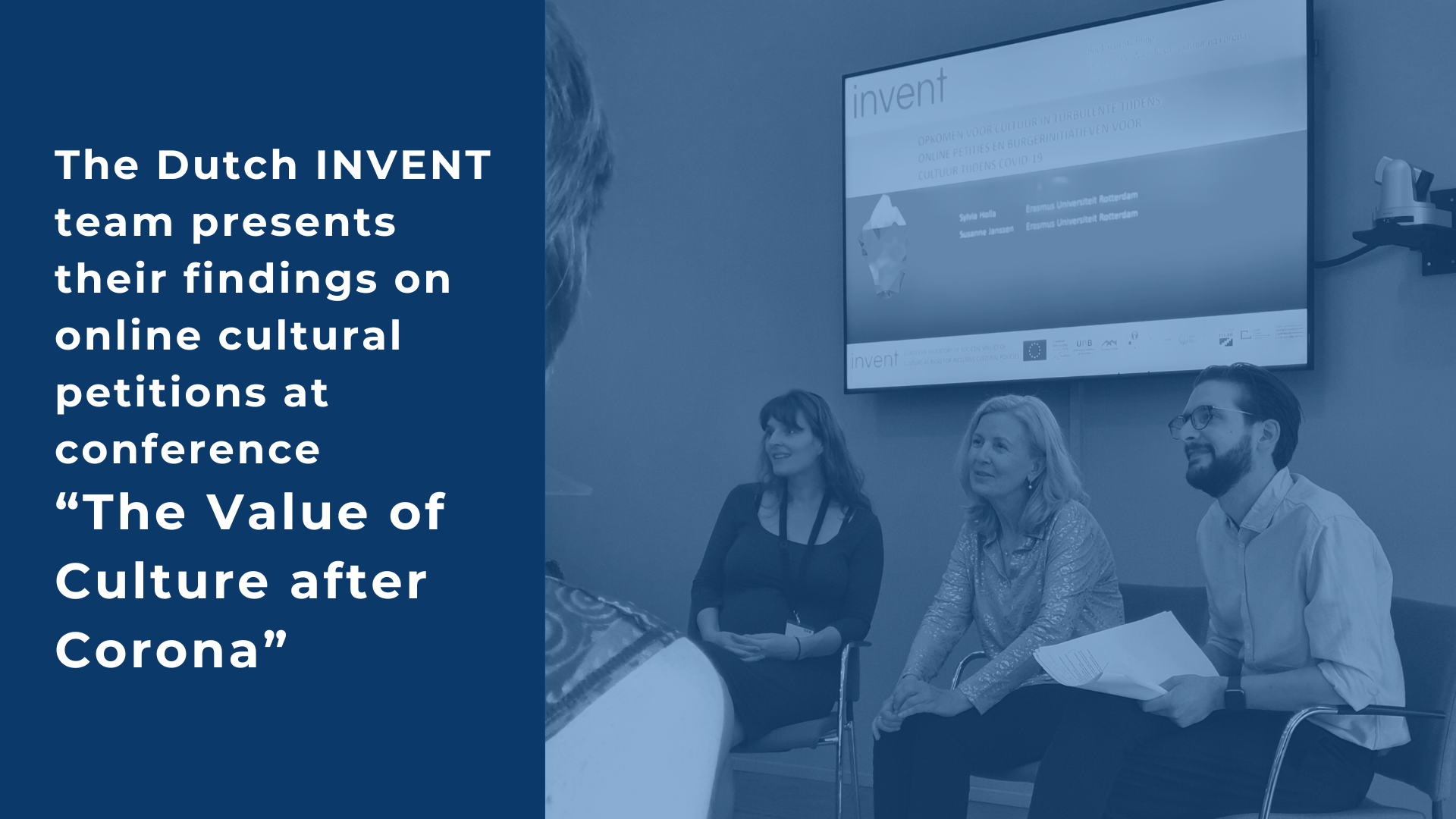On June 30, 2022, the Dutch INVENT team attended the Boekman Foundation conference entitled “The Value of Culture after Corona” and presented their findings from a big-data-analysis of online cultural petitions among Dutch citizens and organizations. The findings presented are part of the second wave of data scraping carried out by the INVENT consortium that explores which cultural petitions dominate the social media landscape in the years preceding and following the Covid-19 Pandemic.
Organized in collaboration with Utrecht University, the Boekman Foundation Conference was held in the prestigious Academy Building in Utrecht welcoming nearly 200 cultural scholars, policymakers, and practitioners. The Guest of Honor was Dutch state secretary of Culture and Media, Gunay Uslu, who opened the conference.
The keynote lecture was given by Prof. Eleonara Belfiore who urged everyone to reconsider the ‘normality’ that represented the cultural sector before the pandemic and to reconceptualize the value of culture afresh. The conference went on to feature nine presentations of state-of-the-art research by Dutch scholars. (See full conference programme here).
In their presentation entitled “Advocating for culture in turbulent times: online petitions and citizen’s initiatives on culture before and during Covid-19”, INVENT team members Sylvia Holla and Susanne Janssen shared how the value of culture was captured in the salient cultural petitions circulating among the Dutch society. They were able to sketch the Dutch petitioning landscape by investigating the different platforms available and delving deeper into the most popular Dutch petition platform, petities.nl, to reveal that 11% of petitions of the platform are related to culture. Furthermore, 20% of all signatures this platform amasses are in some form related to culture.
When looking specifically at the cultural petitions scraped from Facebook, the data revealed that trending topics preceding the pandemic include popular culture, racism, and national traditions. These continue to remain relevant and trending during the pandemic, in addition to newer concerns for freedoms and opportunities that the covid-19 measures inhibited, as well as concerns of national history and religious representation.
When it comes to petitions during the years of Covid, it is no surprise that Arts & Culture, Going out, Entertainment & Tourism, and Sports were significantly bigger categories within the overall mass of cultural petitions compared to years before, the latter category being especially successful in gaining signatures. This indeed speaks to a resurgence of appreciation and value seen in cultural participation. Additionally, even in times of Covid there continue to be a large percentage of signatures for causes related to History, Culture & Tradition, perhaps also hinting at an introspectiveness that was brought about during the pandemic and an awareness of value that culture in the sense of identity, customs and traditions holds.
The discussion following their presentation centered on why people petition, about the nuanced perspectives that lie in between the polarizing extremes that tend to be petitioned for, and how this dialogue can be better encouraged. The data also revealed a diversity of understandings of culture and the range of what is considered valuable enough for audiences to raise their voice through petitions. Some implications shared for the policy officers in attendance therefore included taking heed of this diversity and to explore ways in which petitions platforms can be optimized and used as more sustainable tools for addressing the right local and national governing bodies.
During her opening speech, the Dutch state secretary of Culture and Media, Gunay Uslu called on all in attendance to consider the subject of ‘a common language’ and the importance it plays in rebuilding and reimagining a cultural sector together with researchers, policy officers and practitioners who each have their own discipline and role falling under this umbrella term. This sentiment was resounded all throughout the conference and during the final concluding debate that saw the day’s speakers return to the question “What is the value of culture after corona?” The central takeaway being that the value of culture has in essence remained much the same, however the pandemic has heightened an awareness of this value among everyday audiences, as well as among actors within the sector who see an increased importance for sharing a common language, or rather understanding, across disciplines when it comes to fostering a healthy thriving cultural sector.
INVENT is proud to play its part by continuing to uncover bottom-up understandings of culture through research and making them accessible in a ‘common language’. A goal that is to be achieved through and embodied in the INVENT Project’s ultimate production: The Inventory, a dynamic tool resembling an inter-linked e-dictionary containing the project’s study results in a way to easily facilitate the creation of more inclusive cultural policy.



 This project has received funding from the European Union’s Horizon 2020 research and innovation programme under grant agreement No
This project has received funding from the European Union’s Horizon 2020 research and innovation programme under grant agreement No
Leave A Comment